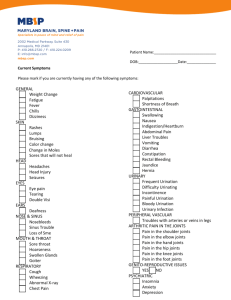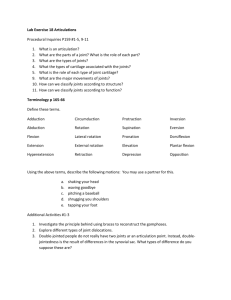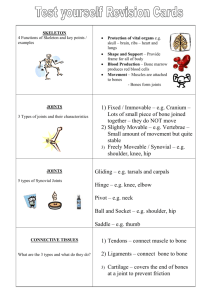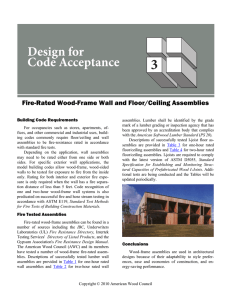Head-of-wall - Gooding and Associates
advertisement
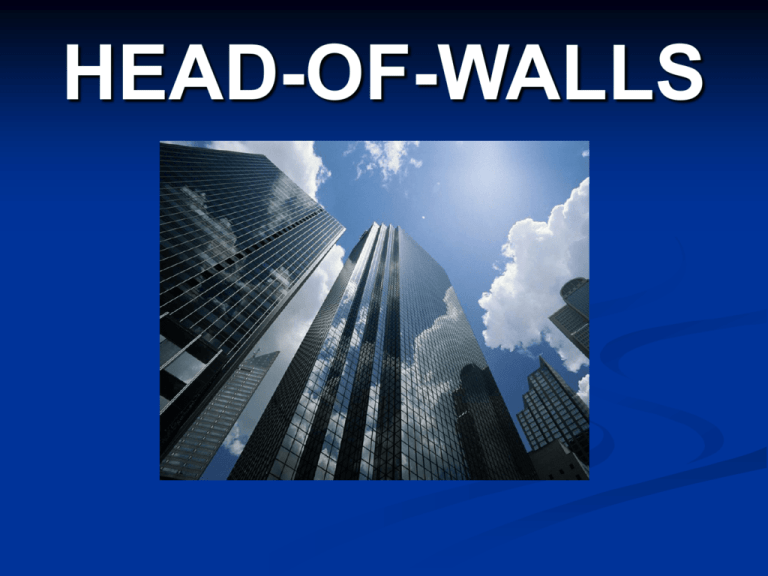
HEAD-OF-WALLS Presenter-Brice Miller 23 years as Building Official, Inspector and Plans Examiner Past President of Colorado Chapter of International Code Council (ICC) ICBO Education and Certification Committee ICC Board of International Professional Standards ICC - IBC General Code Development Committee Code Instructor for Front Range Community College (Part time) for 12 years Program Outline Where firestopping is required Codes and Standards Understanding Underwriters Laboratories Different types of Head-of-wall joints A look at Mechanical Joint Systems Plans examiner & Field inspector helpful hints Why is Firestopping Required? To compartmentalize and prevent the spread of flame and smoke through a structure during a fire. Mandated by Codes and Standards Where is Firestopping Required? Perimeter Containment Membrane Penetrations Through Penetrations Construction Joints Five Types of Joint Systems Bottom - of – Wall Floor – to – Floor Floor – to – Wall Wall – to - Wall Head – of - Wall A NEED FOR FIRE RESISTIVE HEAD-OF-WALL JOINTS In a typical building there are more square feet of opening at Head-of-Wall joints then there are in through penetrations MGM Grand Hotel One Meridian Plaza First Interstate Bank North Ridge Earthquake International and other Model Code Organizations (MCO) ICC – International Code Council (International Building Code) ICBO – International Conference of Building Officials (Uniform Building Code) BOCA – Building Officials and Code Administrators (National Building Code) SBCCI – Southern Building Code Congress International (Standard Building Code) WHERE REQUIRED All top of wall joints to protect the firerated assembly Exit Enclosures 1019.1 Shaft Enclosures 707.4 Exit Passageways 1021.3 Horizontal Exits 1022.2 Occupancy Separations 508.3 Incidental Use Areas 508.2 Fire Walls 705.4 Fire Partitions 708.1 Corridor walls 1017.1 Sleeping units Control Areas 414.2 Atrium Separations 404.5 Single-Occupancy fire areas 706.3.9 CODE REQUIREMENTS -2006 IBC Section 713.1 Fire Resistive Joint systems • “Joints installed in or between fire resistance rated assemblies shall be protected by an approved fire-resistant joint system designed to resist the passage of fire for a time period not less than the required fire-resistance rating of the assembly in which it is installed.” Section 713.2: Installation Fire-resistant joint systems shall be securely installed in or on the joint for its entire length so as not to dislodge, loosen or otherwise impair its ability to accommodate expected building movements and to resist the passage of fire and hot gasses HEAD-OF-WALL FIRE RESISTIVE JOINTS Must accommodate structural compression and extension Maintain the fire resistance properties of the wall and roof/floor structure. Be tested and listed by an approved agency Categories of Fire-Resistive Joints Sealant Systems (Caulks) Sprayed /Elastomeric Membranes (Sprays) Mechanical Joints Load Roof or Floor Deck 1/2” Deep Leg Track Steel Stud Gypsum Wallboard Mineral Wool Elastomeric Caulk or Spray Roof or Floor Deck Fire Rated Gypsum Compound Mechanical joint 1” Steel Stud Overlapping Gypsum Wallboard Gypsum Wallboard and here Movement takes place here Load Mechanical Joint Steel Stud Overlapping Gypsum Wallboard Gypsum Wallboard Roof or Floor Deck Fire Rated Gypsum Compound CYCLE TEST (MOVEMENT) Furnace Test (Hour Rating) U.L. 2079 & A.S.T.M. E 1966 Hose Stream Test (Impact/Temperature Shock) Test Standards / Components UL Cycle Class Listings Movement Class Min.# Of Cycles Min. Cycling Rate (Cycles Minutes) Class l (Thermal) 500 1 Class ll (Wind Sway) 500 10 Class lll (Seismic) 100 400 30 10 Composition of Mineral Wool Movement Characteristics of Fire Caulks or Sprays Additional Components Stud to Track Connection Properties of Head-of-Wall Fire Resistive Deflection Joints Where Can I Find The Most Current Listing? http://www.ul.com U.L. LISTINGS NOMENCLATURE HW-D-0060 HW = Head of Wall D = Dynamic (Subject to Movement) 0060 = Nominal Joint Width If starts with “0” (0000 – 0999) = Nom. Joint width < 2” If starts with “1” (1000 – 1999) = Nom. Joint width > 2” and < 6” Sample U.L. Listing System Number HW-D-???? Assembly Ratings - 1 & 2 Hrs. (See Item 2) Nominal Joint Width - 1 in. Class II Movement Capabilities – 18.75%Compression or Extension ACTUAL MOVEMENT IS 3/16” COMPRESSION OR EXTENSION U.L. LISTING/MECHANICAL System Number HW-D-0060 Assembly Ratings - 1, 2 & 3 Hrs. (See Item 2) Nominal Joint Width - 1 in. Class II and III Movement Capabilities - 100% Compression or Extension ACTUAL MOVEMENT IS 1” COMPRESSION OR EXTENSION The First and Most Important) FIRE TRAK Question to Ask! How much movement (compression and/or extension) do I need? Everybody else NON CODE COMPLIANT HEAD-OF-WALL JOINT Listed and Tested Headof-Wall Assemblies View some details that will perform structurally when exposed to fire. SMOKE BARRIERS Section 713. 6 of the IBC requires an L rating of 5 or less. Joints systems in these assemblies needs to be designed and constructed to restrict the movement of smoke. The type of rating used is an L Rating which is a measurement of air leakage rate through a fire resistive joint system or penetration. Plans Examiners and Inspectors PLANS EXAMINERS As part of your plan review, are you checking the below items as it relates to the Head-of-wall joints: Determine the rate of building deflection ( range of motion) Identify the tested and listed head-of-wall system for every interior non load baring partition. RECOMMENDED CORRECTION NOTICE Deflection and firestop tracks are required to be installed with an approved joint system per section 713 of the IBC. The assemblies need to be designed to allow head-of-wall joints to compress and extend with movement of structure above while maintaining the fire-rating of the assemblies. Please clarify building deflection to determine movement capabilities of assembly and identify listed assemblies for these ceiling runners. HEAD-OF-WALL INSPECTION IBC CODE REQUIREMENT Section 109.3.6 Fire-resistant penetrations. Protection of joints and penetrations in fire-resistancerated assemblies shall not be concealed from view until inspected and approved Field Inspection If the deflection rate is under (1) one inch you may not have to observe the top track until the final inspection. If a mechanical joint is required you will need to: Be provided with the UL listed assembly as approved on the plans. Determine all interior non load baring partitions that require a fire rating and inspect during framing inspection. Observe the ceiling runner for the U.L label that is located on the side of the mechanical joint system. Engineering Judgments Sources: Third Party Labs (UL) Fire Protection Engineer Professional Engineer Manufacturer Only used when tested systems are not available. The EJ’s Must be based on sound engineering practice and knowledge of both field application and capabilities of system components HEAD-OF-WALLS Call Brice Miller: 970-204-1431 Visit our website: www.firetrak.com Email Brice: brice@firetrak.com How can I or other associates learn more about head-of-wall joints?

